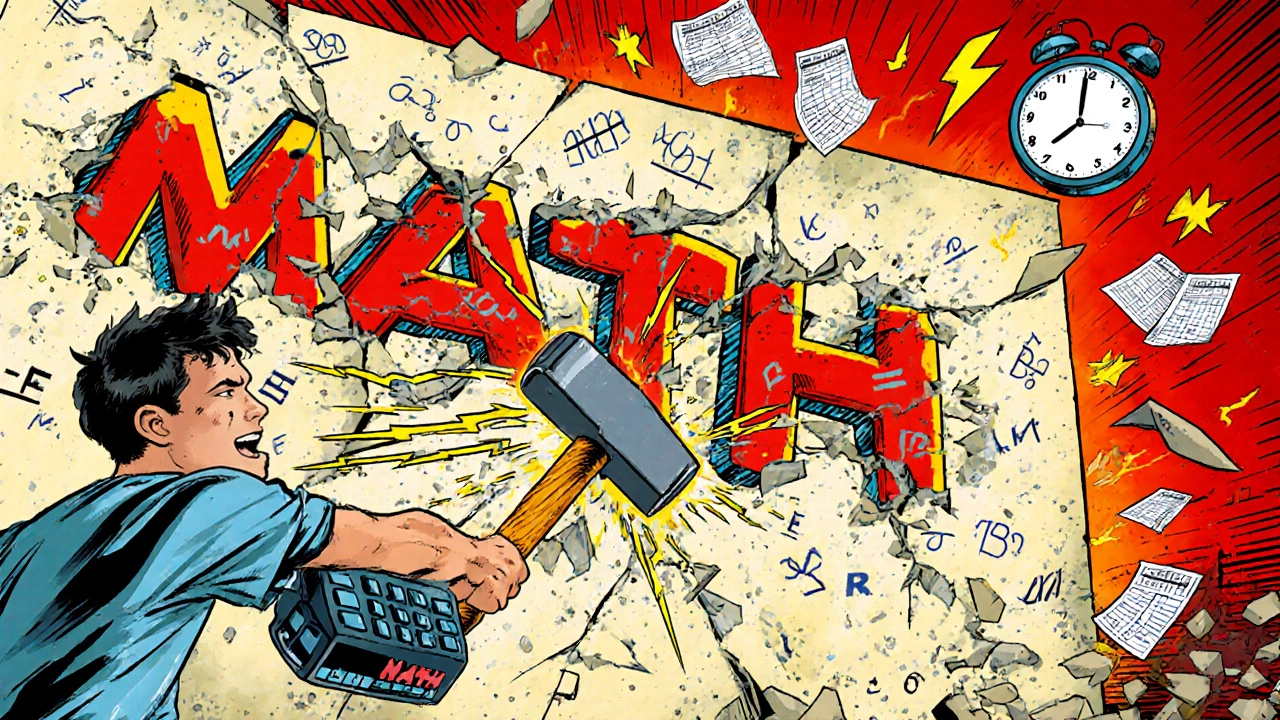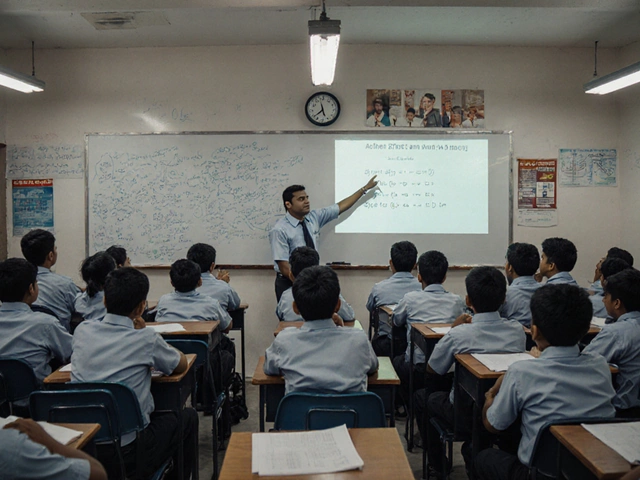IIT-JEE Subject Difficulty Analyzer
Mathematics
Highest standard deviation and lowest average score indicate high difficulty and wide performance gap.
Difficulty Level: 5/5Physics
Conceptually demanding with high score variability and moderate average scores.
Difficulty Level: 4/5Chemistry
Consistently highest average scores with lower variability, making it the easiest.
Difficulty Level: 3/5| Subject | JEE Main Avg % | JEE Advanced Avg % | Std Dev (Main) | Std Dev (Adv) |
|---|---|---|---|---|
| Mathematics | 35% | 33% | 14 | 15 |
| Physics | 38% | 35% | 12 | 13 |
| Chemistry | 42% | 39% | 9 | 10 |
Recommended Study Plan
Every year thousands of aspirants ask the same question: toughest subject in IIT-JEE. The answer isn’t a simple "Physics is hardest" or "Maths beats Chemistry" - it changes with the exam pattern, the coaching style, and the individual’s strengths. This article breaks down the real difficulty of each subject, backs it up with recent paper analysis, and gives you practical ways to handle the hardest parts.
Understanding the JEE Landscape
First, let’s set the stage. IIT‑JEE is the umbrella term for two consecutive exams: JEE Main, which serves as a qualifying gateway, and JEE Advanced, the final filter for the 23 IITs that offer engineering seats.
Both papers test three core subjects - Physics, Chemistry, and Mathematics. The weight each subject carries can differ year‑to‑year, but the total number of questions stays roughly the same: 90‑100 across both stages.
Why Subject Difficulty Varies
Subject difficulty isn’t static. Several factors shape it:
- Question design: JEE designers rotate concepts to prevent predictability. One year may feature many calculus problems, another year leans on optics.
- Curriculum depth: The NCERT textbooks provide the baseline, but JEE adds higher‑order applications that stretch beyond the standard syllabus.
- Coaching focus: Popular coaching institutes such as FIITJEE or Allen tend to emphasize one subject over another based on past success rates. That bias can shape a student’s perception of which subject is toughest.
- Student background: A class‑10 student strong in algebra may find physics harder, while a student with a solid conceptual base in chemistry could breeze through maths.
Because of these moving parts, the “toughest subject” answer usually comes from data: average scores, cut‑off trends, and top‑performer insights.

Data‑Driven Look at Past Papers (2021‑2024)
We examined the last four years of JEE Main and Advanced papers, extracting three metrics for each subject:
- Average percentage of marks obtained by all candidates.
- Standard deviation - a higher spread indicates more variability (and often higher difficulty).
- Top‑10% score contribution - shows how well the best students performed.
The numbers (rounded) are:
| Subject | JEE Main Avg % | JEE Advanced Avg % | Std Dev (Main) | Std Dev (Adv) |
|---|---|---|---|---|
| Physics | 38 | 35 | 12 | 13 |
| Chemistry | 42 | 39 | 9 | 10 |
| Mathematics | 35 | 33 | 14 | 15 |
Two patterns emerge:
- Chemistry consistently claims the highest average, meaning most students score more points there.
- Mathematics shows the largest standard deviation, indicating that while many struggle, the top scorers pull the subject’s ceiling higher.
When you combine average scores with variability, Mathematics appears the most unforgiving - a large gap between the mass and the elite.
Subject‑Wise Toughness Rating
Based on the data above and feedback from recent JEE toppers, we can rank the subjects on a 1‑5 difficulty scale (5 = toughest).
- Mathematics - 5: Complex integrals, coordinate geometry, and high‑order algebra dominate both papers. The sheer volume of problems forces deep conceptual clarity.
- Physics - 4: Requires strong intuition in mechanics, electromagnetism, and modern physics. The experimental‑based questions often need multi‑step reasoning.
- Chemistry - 3: While content is more memorization‑heavy, the conceptual part (Physical Chemistry) still trips many, but the overall scoring is steadier.
Note: “Toughest” here reflects the blend of average performance, score spread, and perceived challenge among high‑achievers.
Tips to Tackle the Hardest Subject (Mathematics)
If mathematics feels like a wall, break it into manageable bricks.
- Master fundamentals quickly: Spend the first two weeks revisiting class‑12 NCERT concepts, especially calculus, vectors, and complex numbers.
- Practice with timed quizzes: Use a bank of at least 200+ JEE‑level questions. Time yourself for 45‑minute blocks - this builds stamina for the marathon day.
- Identify high‑yield topics: Over the last four years, the top 10% of scorers earned 60% of their math marks from 12 topics - e.g., coordinate geometry, integration, and matrices.
- Learn shortcuts, not just formulas: For example, the "area of a triangle using determinant" shortcut cuts down on algebraic manipulation.
- Review errors systematically: Keep an error log. For each mistake, note the concept, the reason (carelessness vs understanding gap), and a corrective action.
Apply the same disciplined approach to Physics and Chemistry, but allocate a slightly lower weekly hour count to Chemistry (since its average scores are higher).

When to Seek Coaching Help
Self‑study works if you have a clear plan and access to quality materials. However, many aspirants benefit from a structured environment:
- Consistent low scores in a subject: If your mock test marks stay below 30% for maths after three full cycles, a coaching institute can provide targeted doubt‑clearing sessions.
- Difficulty with problem‑solving speed: Live classes often simulate exam timing, forcing you to think faster.
- Need for curated question banks: Institutes like FIITJEE offer yearly solved papers that align with the latest JEE pattern.
Remember, coaching is a supplement, not a crutch. Use it to fill gaps, not to replace daily self‑practice.
Key Takeaways
- Mathematics tops the difficulty chart due to low average scores and high score variability.
- Physics follows closely; its conceptual depth makes it a close second.
- Chemistry, while essential, tends to be the highest‑scoring subject on average.
- Data‑driven study - focusing on high‑yield topics and tracking errors - narrows the gap between you and the top‑scorers.
- Coaching should complement, not replace, disciplined self‑study.
Frequently Asked Questions
Which subject has the highest cut‑off for JEE Advanced?
Historically, the physics cut‑off hovers around 30‑35% of the total marks, making it marginally higher than maths and chemistry. This reflects the tougher scoring pattern in physics.
Should I allocate more study time to maths or physics?
If your baseline scores are similar, give mathematics an extra 2‑3 hours per week because its learning curve is steeper. However, if you already ace maths, shift that time to physics to balance your overall profile.
Do NCERT books cover all JEE‑level questions?
NCERT provides the core concepts, especially for chemistry and physics. JEE adds layers of application, so you’ll need supplementary problem banks (e.g., Arihant, previous year papers) to reach exam difficulty.
How can I improve my speed in mathematics?
Practice with timed mock tests, learn shortcuts for common integrals, and solve at least 30‑40 problems daily. Review each test to trim repetitive mistakes.
Are coaching institutes worth the investment?
For most students, a good institute offers structured doubt clearing, regular mock tests, and curated study material. If you’re disciplined and have access to quality self‑study resources, you can succeed without it, but many find the accountability helpful.




